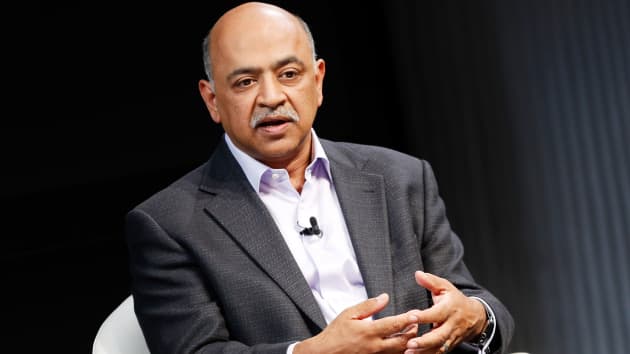
Lauren Hirsch, CNBC
- IBM CEO Arvind Krishna called on Congress Monday to enact reforms to advance racial justice and combat systemic racism, while announcing the company was getting out of the facial recognition business.
- The decision for IBM to get out of the facial recognition business comes amid criticism of the technology, employed by multiple companies, for exhibiting racial and gender bias.
- The company decided to announce its decision as the death of George Floyd brought the topic of police reform and racial inequity into the forefront of the national conversation.
IBM CEO Arvind Krishna called on Congress Monday to enact reforms to advance racial justice and combat systemic racism while announcing the company was getting out of the facial recognition business.
The decision for IBM to get out of the facial recognition business comes amid criticism of the technology, employed by multiple companies, for exhibiting racial and gender bias. Amazon’s own use of facial recognition was put to a shareholder vote last year, with 2.4% of shareholders voting in favor of banning the sale of the technology to government agencies amid privacy and civil rights concerns
“IBM firmly opposes and will not condone uses of any technology, including facial recognition technology offered by other vendors, for mass surveillance, racial profiling, violations of basic human rights and freedoms, or any purpose which is not consistent with our values and Principles of Trust and Transparency,” Krishna wrote in the letter delivered to Congress late Monday. “We believe now is the time to begin a national dialogue on whether and how facial recognition technology should be employed by domestic law enforcement agencies.”
Krishna, who took over the chief executive role in April, has said he is focused on growing IBM’s cloud services, as it looks to catch up to Microsoft and Amazon, while still remaining active in the mainframe business. Shares of the company are up a little over one percent over the year, giving it a market capitalization of $135 billion.
IBM decided to shut down its facial recognition products and announce its decision as the death of George Floyd brought the topic of police reform and racial inequity into the forefront of the national conversation, a person familiar with the situation told CNBC. Top Democrats on Monday unveiled a bill to overhaul police practices, calling for reforms, including changing the federal standard of criminal police behavior and the creation of a federal registry of police misconduct.
IBM’s facial recognition business did not generate significant revenue for the company, the person familiar with the situation said, but the decision remains notable for a technology giant that counts the U.S. government as a major customer. The decision was both a business and an ethical one, the person familiar with the situation said. The company heard in the past few weeks concerns from many constituencies, including employees, about its use of the technology, the person added.
“Artificial Intelligence is a powerful tool that can help law enforcement keep citizens safe. But vendors and users of Al systems have a shared responsibility to ensure that Al is tested for bias, particularly when used in law enforcement, and that such bias testing is audited and reported,” Krishna wrote.
The letter supported many of the reforms included in Monday’s bill, including reforms to “qualified immunity” currently offered to officers, in order to make it easier for those whose constitutional rights were violated to recover damages.
Krishna called on the Congressmen to consider legislation such as the Walter Scott Notification Act, sponsored by Republican Sen. Tim Scott of South Carolina, which would require states receiving federal funding to disclose more details around the use of deadly force by law enforcement officers to the Department of Justice.
The letter called for expanded training and education that Krishna said “is key to expanding economic opportunity for communities of color.” That includes scaling “P-Tech,” the school program backed by IBM that combines training for high school, college and the professional world. There are currently 150,000 students in 220 schools in primarily “educationally underserved areas.”
Krishna also advocated for the expansion of Pell Grants — federal subsidies for students of need — beyond traditional four-year programs.


